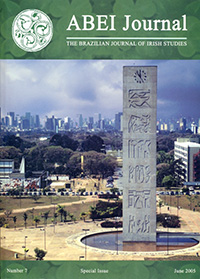Conjuring and Conjecturing: Friel’s Performances
DOI:
https://doi.org/10.37389/abei.v7i1.184212Keywords:
Brian Friel, Performances, CharactersAbstract
Though most critics were negative about Performances I believe this is a vintage Friel play, first in its theme: (1) its interaction of different languages (whereby music is more important than ever) and (2) its illustration of epistemological questions (especially the question of performativity), but also in its components: (1) the seemingly fruitless journey, (2) the opposition Dionysiac-Apollonian forces, (3) the communication which fails, due to the strong narcissism of one of the protagonists. As Performances is really the staging of the epistemological journey of a PhD student, Anezka, who probes into the force of Janacek’s passionate desire for his muse Kamila Stösslova, desire will be a key concept in the play. This interaction between the student and the dead author’s work is represented by a live Janacek. Though Friel used this device before (in Faith Healer) it is more to the point now, as it allows the playwright to stage the postmodern awareness that “the author is dead”: it is his work that is alive, and challenging both readers and performers. It is interesting that a pronounced division between two kinds of reading is sustained throughout the play. On the one hand, Janacek appears as a self-centred figure who refuses to have his authorial position challenged, and sees language as a representative-imitative tool. Anezka, on the other hand, looks at expressions in a more Deleuzian way, not focusing on the product but on the production, its heterogeneity and inconsistenties. Though Janacek keeps turning Anezka’s interpretations down, she will turn out to be the more convincing, as she discovers the maestro’s discordant desires, not only in his social relations and in his poetics but also in the way he maintains his authorial position. His own solipsistic stance will be unmasked by the echoes in his own text, by his use of shifters and by the “general iterability”Derrida considers essential to language as such, but which is exacerbated in the quoting practice which is even more visibly effective in research work as well as in music performances.
References
Butler, Judith. Undoing Gender. NY/London: Routledge, 2004.
____. Excitable Speech: A Politics of the Performative. London: Routledge, 1997.
Culler, Jonathan. “Philosophy and Literature: The Fortunes of the Performative.” Poetics Today 21:3 (2000): 503-19.
Deane, Seamus. Brian Friel, Plays 1. Introduced by Seamus Deane. ff Contemporary Classics. London: Faber & Faber, 1996.
Friel, Brian. Plays 1. Introduced by Seamus Deane. ff Contemporary Classics. London: Faber & Faber, 1996.
____. Faith Healer. London: Faber & Faber, 1980.
____. The Communication Cord. Faber and Faber. London, 1983.
____. Fathers and Sons, by Brian Friel, after the novel by Ivan Turgenev. London/Boston: F&f, 1987.
____. Wonderful Tennessee. London: Faber &Faber, 1993.
____. Performances. Loughcrew: Gallery Books, 2003.
____. The Home Place. Loughcrew: Gallery Books, ed. Peter Fallon, 2005.
Lecercle, Jean-Jacques. “Another Philosophy of Language: Style and Stuttering”. Deleuze and Language. London: Macmillan/Palgrave, 2002. 218-57.
Lyons, Donald. “Going Nowhere” in New Criterion. (December 1993): 53-6.
McGrath, F.C. Brian Friel’s (Post)Colonial Drama. Language, Illusion, and Politics. New York: Syracuse UP, 1999.
Pine, Richard. Brian Friel and Ireland’s Drama. London/NY: Routledge, 1990.
Shuttleworth, Ian. Financial Times, http://www.cix.co.uk/shutters/reviews/03065.htm
Yeats, WB. Collected Poems, London: Macmillan, 1981.
Downloads
Published
Issue
Section
License
Copyright (c) 2005 Hedwig Schwall

This work is licensed under a Creative Commons Attribution-NonCommercial 4.0 International License.


